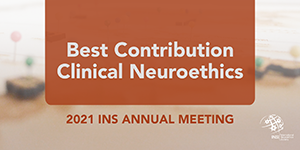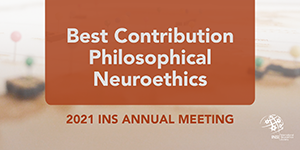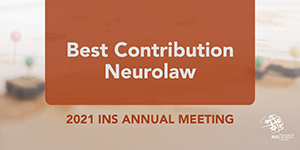PostersThe INS is not responsible for the scientific data or conclusions presented. Top abstracts and presentations recognizedThe following authors received recognition for their abstracts and presentations. Review their work and all research accepted to the meeting and presentations available for attendees and members. Abstracts
Oral Presentations
Posters / Presentations
EmpiricalPresentation 2 / BEST ABSTRACT Risks, Benefits, and Value: Patient-Participant Perspectives on Basic Intracranial Human ResearchAlly Peabody Smith (1), Lauren Taiclet (2), Hamasa Ebadi (3), Nader Pouratian (4), Ashley Feinsinger (5) / Contact: [email protected], [email protected] Abstract / Poster / Video / Presenting in the Poster Hall: November 5 at 1:30pm (EDT)
Presentation 3Neuroethics Literacy in Brazil: Shaping the Future in the Global Neuroethics DiscussionAngélica Francisco de Oliveira Dutra de Morais (1,4), Maria Inês Nogueira (1,2,4), Marisa Russo (1,3,4) / Contact: [email protected]
Presentation 4 / BEST ABSTRACT HONORABLE MENTION Off-label promotion of transcranial magnetic stimulation (TMS) by providersAnna Wexler (1), Ashwini Nagappan (1,2), Deena Kopyto (1), Emiliano Santarnecchi (3,4), Alvaro Pascual-Leone (4,5,6) / Contact: [email protected] Abstract / Featured in the Research Presentations: November 4 at 6:00pm (EDT)
Presentation 5Cross analysis of literature and clinical guidelines regarding psychiatric electroceutical interventions (PEIs) with practical concerns of psychiatristsEleni Varelas, Robyn Bluhm, Eric Achtyes, Aaron M. McCright, Laura Y. Cabrera / Contact: [email protected] Abstract / Poster / Presenting in the Poster Hall: 12:00pm (EDT)
Presentation 6Continued access in experimental deep brain stimulation research: Researcher and participant perspectivesGabriel Lázaro-Muñoz (1), Michelle Pham (1), Kristin Kostick (1), Katrina A. Muñoz (1), Clarissa Sanchez (1), Laura Torgerson (1), Rebecca Hsu (2), Lavina Kalwani (3), Richa Lavingia (1), Demetrio Sierra-Mercado (1,4), Jill O. Robinson (1), Simon Outram (5), Barbara A. Koenig (5), Philip A. Starr (5), Kelly D. Foote (6), Aysegul Gunduz (6), Michael Okun (6), Stacey Pereira (1), Wayne K. Goodman (1), Amy L. McGuire (1), Peter Zuk (1,3) / Contact: [email protected] Abstract / Only available in the Poster Hall
Presentation 7The Spectrum of Data Sharing Policies in Neuroimaging Data RepositoriesAnita S. Jwa (1), Russell A. Poldrack (2) / Contact: [email protected]
Presentation 8Modeling complex prosocial behavior: Robustness and neuroethics in translational rodent experimentsGordon H. Dash (1), Nina Kajiji (2), S. Tiffany Donaldson (3) / Contact: [email protected]
Presentation 9A literature review and ethical examination of epilepsy surgery’s 'last resort’ status: an outdated rhetorical device?Ian M. Stevens, BA/BS(1) & Ahmed M. Raslan, MD(2) / Contact: [email protected]
Presentation 10Online comments about DBS for opioid addiction: Public perceptions and concerns1. Jack Koczara 2. Dr. Robyn Bluhm, Ph.D. 3. Dr. Laura Y. Cabrera, Ph.D. / Contact: [email protected]
Presentation 11 / Best Contribution: Clinical Neuroethics The Need for Preservation of Medical Decision Making with Diminished Capacity1. Jennifer Jin, 2. Gillian Hue / Contact: [email protected] Abstract / Poster / Video / Presenting in the Poster Hall: Thursday at 9:00am and 7:30pm (EDT); Friday at 8:00am and 6:00pm
Presentation 12A brain organoid created from my cells? Perspectives of potential donors to brain organoid researchKate MacDuffie (1,2), Benjamin Wilfond (1,2), Ishan Dasgupta (1), Andreas Schönau (1), Sara Goering (1), Eran Klein (1,3) / Contact: [email protected] Abstract / Poster / Presenting in the Poster Hall: Friday at 6:00pm (EDT)
Presentation 13Pressing Ethical Issues in Considering Pediatric Deep Brain Stimulation for Obsessive-Compulsive DisorderKatrina A. Muñoz [1], Kristin Kostick [1], Laura Torgerson [1], Peter Zuk [1], Lavina Kalwani [2], Clarissa Sanchez [3], Jennifer Blumenthal-Barby [1], Eric A. Storch [1, 4], Gabriel Lázaro-Muñoz [1] / Contact: [email protected]
Presentation 14Physician perspectives on closed-loop neuromodulation in epilepsy careKristina Celeste Fong, Tobias Haeusermann, Cailin Lechner, Alissa Bernstein Sideman, Winston Chiong, Dan Dohan / Contact: [email protected]
Presentation 15"Retraining your brain": An Empirical Assessment of Ethical Concerns and Attitudes of Users of Electroencephalography NeurofeedbackLouiza Kalokairinou 1, Ashwini Nagappan 1, Rebekah Choi 1, Anna Wexler 1 / Contact: [email protected]
Presentation 16Coverage of medical cannabis by mainstream and alternative Canadian news media: Implications for neuroethical inquiry1 Margot Gunning; 1 Alissa Wong; 1 Judy Illes / Contact: [email protected] Abstract / Poster / Presenting in the Poster Hall: 10:00–10:30am (EDT)
Presentation 17Harm reduction as an ethics priority for authorizing medical cannabis in the care of youth with brain and non-brain cancers1 Margot Gunning;1 Ari D. Rotenberg;2 Lauren E Kelly;3 Bruce Crooks;4 Sapna Oberoi;5, 6 Adam L. Rapoport;7 S. Rod Rassekh;1 Judy Illes; / Contact: [email protected] Abstract / Video / Featured in the Research Presentations: November 4 at 6:00pm (EDT)
Presentation 18Psychiatric electroceutical interventions and their potential to influence personality: A cross-analysis of survey and interview results1:Marissa Cortright, 2:Robyn Bluhm, 3:Eric Achtyes, 4:Aaron M. McCright, 5:Laura Y. Cabrera / Contact: [email protected]
Presentation 19An assessment tool for the public opinion of the moral status of Artificial IntelligenceMeghan Hurley (1), Gillian Hue (1) / Contact: [email protected] Abstract / Poster / Presenting in the Poster Hall: November 5 at 1:00–1:30pm (EDT)
Presentation 20Ethical considerations for navigating industry partnerships: Findings from interviews with neurotechnology researchersTristan McIntosh, PhD / Contact: [email protected] Abstract / Poster / Presenting in the Poster Hall: November 4 at 9:00am (EDT)
Presentation 21The risks of borrowed trust: a cautionary case study from a qualitative study exploring the use of DBS for addictionErika Versalovic (1), Marion Boulicault (1), Sara Goering (1), Eran Klein (1,2) / Contact: [email protected] Abstract / Slides / Presenting in the Poster Hall: 4:00pm (EDT)
Presentation 22Prospect theory and judgments about cognitive repairKianté A. Fernandez (1), Brain A. Erickson (1), Byron Biney (1), Joseph W. Kable (3), Roy H. Hamilton (2), John, D. Medaglia (1, 2) / Contact: [email protected]
Presentation 23Child and adolescent psychiatrists' knowledge, attitudes, and experiences with polygenic risk scoresStacey Pereira 1, Katrina Muñoz 1, Brent J. Small 2, Takahiro Soda 3, Laura Torgerson 1, Clarissa Sanchez 1, Jehannine Austin 4, Eric A. Storch 1, Gabriel Lázaro-Muñoz 1 / Contact: [email protected] Abstract / Only available in the Poster Hall
Presentation 24Early indications: an ethical review of patent practices in neuroscienceAri Rotenberg (1), Ashley Lawson (1), Stacey Anderson-Redick (2), Zelma Kiss (2), Judy Illes (1) / Contact: [email protected] Abstract / Presenting in the Poster Hall: 5:00pm (EDT)
Presentation 25Perceived ethical concerns to using psychiatric electroceutical interventions revealed in a national survey of psychiatrists, patients, caregivers, and the general publicLaura Y. Cabrera [1,2,3], Maryssa M.C. Gilbert [4], Robyn Bluhm [5,6], Eric Achtyes [7,8], Aaron M. McCright [9] / Contact: [email protected]
Presentation 26A Scoping Review of Ethical, Legal, and Social Issues in Behavioral Variant Frontotemporal DementiaBrian Lee (1), Anirudh Nair (2), and Veljko Dubljevic (3) / Contact: [email protected], [email protected], [email protected]
Presentation 27 / Best Oral Presentation “It's better to stay away from tablets, even if they are vitamin tablets”: parental perceptions of nutritional supplements for cognitive enhancement in India1. Jayashree Dasgupta & 2. Georgia Lockwood Estrin; 3. Zenia Yadav; 4. Ilina Singh / Contact: [email protected]; [email protected] Abstract / Video / Featured in the Research Presentations: November 5 at 1:30pm (EDT)
Presentation 28Physician's experiences in DBS for refractory epilepsy: a survey study of informed consent practices, side effects and standard operating proceduresKarmele R. Olaciregui Dague, MD1, Rainer Surges, MD1. / Contact: [email protected], @k_olaciregui
Presentation 29 / Best Overall Poster The “Unusable” Data Crisis: The Origins of Racial Bias in Electrophysiology and A Roadmap for InclusionKate Webb 1, John Etter 2, Jasmine Kwasa 3. / Contact: [email protected]
Presentation 30Clinical and Psychosocial Factors Considered When Deciding Whether to Offer Deep Brain Stimulation for Childhood DystoniaLaura Torgerson [1], Katrina A. Muñoz [1], Kristin Kostick [1], Peter Zuk [1], Jennifer Blumenthal-Barby [1], Eric A. Storch [1, 2], Gabriel Lázaro-Muñoz [1] / Contact: [email protected], 303-249-1700
Presentation 31BCI's Impact on User Agency: Mapping the TerrainAndreas Schönau (1,2), Ishan Dasgupta (1,2), Tim Brown (1,2), Erika Versalovic (1,2), Sara Goering (1,2), Eran Klein (1-3) / Contact: [email protected]
Presentation 32Indigenous Knowledges in Brain and Mental Health: A Scoping Review1. Louise Harding, 2. Caterina Marra, 3. Vyshu Manohara, 4. Judy Illes / Contact: [email protected] Abstract / Poster / Presenting in the Poster Hall: November 5 at 1:00pm (EDT)
Presentation 33Ethical Implications of Brain-Computer Interfaces: A Comparison of Public and Provider PerceptionsMaya Roytman (1), Nathan A. Shlobin BA (2), Joshua M. Rosenow MD (2), Joseph Vukov PhD (1) / Contact: [email protected] Abstract / Only available in the Poster Hall / Presenting in the Poster Hall: November 4 at 8:15pm (EST)
Presentation 34COVID-19, lockdown and the role of environment in drug preference: Implications for addiction neuroscience.Nicholas Sinclair-House [1, 2, 3] and Sarah Osborn [1] / Contact: [email protected]
Presentation 35The History, Future, and Ethics of Brain-Based Visual Prosthetics ResearchPeter Zuk / Contact: [email protected]
Presentation 36Participant Perspectives on Personality, Identity, Mood, and Behavioral Changes in Experimental Deep Brain StimulationPeter Zuk[1], Clarissa E. Sanchez[2], Kristin Kostick-Quenet[2], Katrina A. Muñoz[2], Lavina Kalwani[2], Richa Lavingia[3], Laura Torgerson[2], Demetrio Sierra-Mercado[4,2], Jill O. Robinson[2], Stacey Pereira[2], Simon Outram[5], Barbara A. Koenig[5], Phil A. Starr[6], Aysegul Gunduz[7,8], Kelly Foote[7], Michael Okun[7], Wayne K. Goodman[9], Amy L. McGuire[2], Gabriel Lázaro-Muñoz[1,10] / Contact: [email protected]
Presentation 37 / Best Oral Presentation Neuroethical challenges of screening for brain injury in women who have experienced intimate partner violenceQuinn Boyle (1, 3), Deana Simonetto (2), Paul van Donkelaar (3), Judy Illes (1) / Contact: [email protected] Abstract / Video / Featured in the Research Presentations: November 4 at 6:00pm (EDT)
Presentation 38Empirical Research on the Ethics of Brain-Computer Interface Technology: A Scoping ReviewAbigail Presley, Allen Coin, and Veljko Dubljević / Contact: [email protected]
Presentation 39Pediatric Deep Brain Stimulation: Clinicians’ Perspectives on the Most Pressing Ethical ChallengesKristin Kostick(1), Lavina Kalwani(1), Laura Torgerson(1), Katrina Muñoz(1), Clarissa Sanchez,(1) Peter Zuk(1), Eric A. Storch(1), Jennifer Blumenthal-Barby(1), Gabriel Lázaro-Muñoz(1) / Contact: [email protected]
Presentation 40Ethical perspectives from AI experts on reverse-engineering the brainSean Douglas1, Nora Edgren1 and Veljko Dubljević1 / Contact: [email protected]
HumanisticPresentation 41Protecting individuals and societies from brain and mental data technologies: A structured landscape reviewAnita Jwa (1), Nicole Martinez-Martin (2) / Contact: [email protected]
Presentation 42Positioning neurorights in Ibero-AmericaJosé M. Muñoz (1-3), Diego Alejandro Borbón Rodríguez (3-4), María Isabel Cornejo Plaza (5), Agustín A. Herrera Fragoso (3,6), José Ángel Marinaro (7-8), Sahara Lucía Rosero Huertas (4), José Julián Tole (4), Karen Herrera-Ferrá (3) / Contact: [email protected]
Presentation 43Breaking the Sixth Strategic Domain (A Quantum-Existentialist Perspective of Security)Luis Jacob Retanan / Contact: [email protected] Abstract / Poster / Presenting in the Poster Hall: 2:00–4:00am (EDT)
Presentation 44Moral bioenhancement as a challenge to the achievement of intergenerational justice1. Silviya Serafimova / Contact: [email protected] Abstract / Slides / Presenting in the Poster Hall: 4:00pm (EST)
Presentation 45Considerations in Treating the Deeply Forgetful Cerebral SubjectAnthony G. Chesebro, Krystal K. Laing / Contact: [email protected]
Presentation 46 / Best Contribution: Philosophical Neuroethics Participatory machine learning and social justice in the personalization of neurological interventionsAshley Walton / Contact: [email protected]
Presentation 47Electroconvulsive Therapy in Argentina: The Disagreement between the Public Policy and the Scientific Consensus1. Paula Castelli 2. Salvador Guinjoan 3. Nicolás Serrano 4. Abel Wajnerman Paz 5. Arleen Salles / Contact: [email protected]
Presentation 48Lessons in pedagogy from teaching neuroethics in year one of the COVID-19 pandemicAnn E. Fink (1), Gillian Hue (2) / Contact: [email protected]
Presentation 49Regulating Neurotech Through The "Think Tank"Natalia Montes (1,2), Andreas Schönau (1,2) / Contact: [email protected]
LegalPresentation 50Why are neuro-rights important? Data economy and the privacy laws in South Korea1. Ji Hyun Yang 2. Sung-Jin Jeong 3. Hee Tae Suk 4. In Young Lee 5. So Yoon Kim / Contact: [email protected]
Presentation 51 / Best Contribution: Neurolaw Neurolaw & Critical Forensic Science Scholarship: A Call for Focused IntegrationRoland Nadler (1) & Emma Cunliffe (1) / Contact: [email protected]
Presentation 52Cognitive capacity and the right to die: Legal and ethical considerations of medical-aid-in-dying in North AmericaMichael J. Menconi Jr.[1], Veljko Dubljevic [2] / Contact: [email protected]
See also Presentation #71: 'An Eye for an Eye: The Disturbing Relationship between Psychiatric Illness and the American Death Penalty', by Sunidhi Ramesh.
TheoreticalPresentation 53A conceptual framework for discussing a consensus definition of the neuroright to free willJosé M. Muñoz (1-3) / Contact: [email protected]
Presentation 54Cognitive Complexity and Assessments of Capacity in DementiaGeorge Mellgard (1); Nada Gligorov (2) / Contact: [email protected]
Presentation 55Inclusive neuroinnovation: setting the challenge for diversity and representationJohn Noel Viana / Contact: [email protected]
Presentation 56From Genomes to Brainomes: What Shouldn't Insurance Companies Know?Jonathan Pugh / Contact: [email protected] Abstract / Video / Presenting in the Poster Hall: Thursday at 9:00am (EDT)
Presentation 57The elephant in the room is sometimes a monkey: Human exceptionalism and anthropocentrism in neuroethics1. L. Syd M Johnson / Contact: [email protected]
Presentation 58The Consciousness Criterion and the Moral Status ProjectL. Syd M Johnson / Contact: [email protected]
Presentation 59Are New Rights the Way to Mental and Brain Privacy?Daniel Susser and Laura Y. Cabrera / Contact: [email protected]
Presentation 60Neuroethics of Lumbar Punctures (Spinal Taps) for Psychiatric Indications: a justice-minded approachMatthew L. Baum (1,2), Scott M. Lee (1,3) / Contact: [email protected] Abstract / Video / Presenting in the Poster Hall: November 4 at 9:00am (EST)
Presentation 61Memory modification and authenticity: a narrative approachMuriel Leuenberger / Contact: [email protected] Abstract / Video / Presenting in the Poster Hall: 8:30am (EDT)
Presentation 62A Study on the Application of Moral Enhancement to Ethical Education in KoreaSeungmin Nam1, Kyounggeun Lee2 / Contact: [email protected]
Presentation 63A feminist standpoint for cognitive neuroscienceVanessa A. Bentley / Contact: [email protected], @pirateV Abstract / Slides / Video / Presenting in the Poster Hall: November 4 at 9:15am (EDT)
Presentation 64An Ethical Approach to Detecting Covert ConsciousnessMichael J. Young, MD, MPhil; Yelena G. Bodien, PhD; Joseph T. Giacino, PhD; Robert D. Truog, MD; Leigh R. Hochberg, MD, PhD; Brian L. Edlow, MD / Contact: [email protected] Abstract / Only available in the Poster Hall
Presentation 65Agency in Augmented Reality: Exploring the Ethics of Facebook’s AI-Powered Predictive Recommendation SystemAndreas Schönau / Contact: [email protected] Abstract / Video / Featured in the Research Presentations: November 5 at 1:30pm (EDT)
Presentation 66Engagement, Exploitation, and Basic Human Neuroscience ResearchAshley Feinsinger (1), Michelle Pham (2), Nader Pouratian (3) / Contact: [email protected] Abstract / Video / Featured in the Research Presentations: November 4 at 6:00pm (EDT)
Presentation 67Untangling the Divine: Religious Coping in Psychotic Illness and a Model for Clinical InvolvementEmily Rodriguez / Contact: [email protected]
Presentation 68Intergenerational Social Justice, Neuroscience of Art and Cultural Genomic Identity and the future of International Cultural Heritage LawEva Bonda / Contact: [email protected]
Presentation 69Consciousness and the Ethics of Cerebral Organoid ResearchKarola Kreitmair / Contact: [email protected]
Presentation 70Should we call it "mind-reading"? Brain-reading technologies and filling in the hermeneutical gaps to promote social justicePaul Andrew Tubig 1, 2 / Contact: [email protected]
Presentation 71An Eye for an Eye: The Disturbing Relationship between Psychiatric Illness and the American Death PenaltySunidhi Ramesh / Contact: [email protected]
Presentation 72How Bad Is It on a Scale of 1 to 10? An Analysis of the Human Experience of Pain and How We Approach ItSunidhi Ramesh / Contact: [email protected]
Presentation 73Internet-based technology, memory, and neuroethics: ethical implications of our cognitive relationships with the Internet and ensuring social justice in an age of rapid technological progressVishruth Nagam (1,2,3,4) / Contact: [email protected]
Presentation 74Prosthetic Self-regulation? DBS and autonomy in Treatment Resistant Depression patientsAbel Wajnerman Paz / Contact: [email protected]
Presentation 75Ethical challenges in brain organoid research and research communication: outlining scope for neuroethical contributionAnna Pacholczyk / Contact: [email protected]; [email protected]
Presentation 76AI in healthcare – examining challenges related to justice and trust, and the contribution of procedural justiceAnna Pacholczyk / Contact: [email protected]; [email protected]
Presentation 77Too rational: How predictive coding’s success risks harming the mentally disordered and illLee Elkin1, Karolina Wiśniowska2 and Veljko Dubljevic1 / Contact: [email protected] Abstract / Featured in the Research Presentations: November 5 at 1:30pm (EDT)
Presentation 78Medical Ethics on Patient Confidentiality: Case Study on Epileptic PatientNimah Alsomali / Contact: [email protected]
OtherPresentation 79Expanding the Neuroethical Ethos: Social Justice and Neuroethics at the Rehab Neural Engineering LabsJuhi Farooqui (1), Sarah Dawod (2), Josep-Maria Balaguer (2), Devapratim Sarma (1) / Contact: [email protected]
Presentation 80Browser-based brain-computer interfaces: What comes after true web access?Garrett Flynn (1,2), Dong Song (2), Marientina Gotsis (1) / Contact: [email protected]
|
